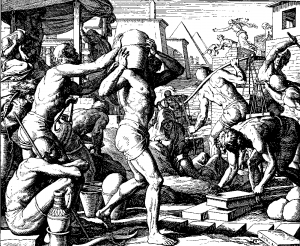In yesterday’s post we posed the question as to whether or not the Children of Israel actually ‘plundered’ the Egyptians? In today’s post we will discover the answer to this fascinating question.
Yesterday, I pointed out the differences between the English translation and the original Hebrew regarding two major key verbs: ‘Va-yishalu’ {וישאלו} (translated as ‘asked’ but should be interpreted as ‘demanded’) and ‘va-yenatzlu’ {וינצלו} (translated as ‘plundered’ but should be interpreted ‘exploited’ or ‘utilized’).

Today we will discuss what exactly the Children of Israel did and why. In order to understand what happened in Egypt, we need to go back to Genesis, to God’s promise to Abraham:
“Then the LORD said to Abram, “Know for certain that your offspring will be sojourners in a land that is not theirs and will be servants there, and they will be afflicted for four hundred years. But I will bring judgment on the nation that they serve, and afterward they shall come out with great possessions.”(Genesis 15:13-15)
God had promised Abraham that his offspring would be servants ‘in a land that is not theirs’ (Egypt) but ‘afterward they shall come out with great possessions’ – meaning the Children of Israel’s demand from the Egyptians was not spontaneous or random.
Leaving ‘with great possessions’ was promised to Abraham long before they actually went into the land of Egypt. Now, on what grounds did the Children of Israel demand ‘great possessions’ from the Egyptians?
Well, we find our answer in the Book of Deuteronomy, in the passage that explains the laws concerning a Hebrew slave/servant:
“…And when you let him go free from you, you shall not let him go empty-handed. You shall furnish him liberally out of your flock, out of your threshing floor, and out of your winepress. As the LORD your God has blessed you, you shall give to him. You shall remember that you were a slave in the land of Egypt, and the LORD your God redeemed you; therefore I command you this today.” (Deuteronomy 15:13-16).
This means according to the Torah law, when a slave/servant finishes his time of slavery, it is FORBIDDEN to let him go free empty-handed! Notice that this passage ends with God’s words as a reminder to the implementation of these laws in Egypt:
“You shall remember that you were a slave in the land of Egypt, and the LORD your God redeemed you; therefore I command you this today.”
Or in other words, the Children of Israel did not ‘plunder’ the Egyptians but rather claimed their God given rights and ‘exploited’ the opportunity to get what was legally theirs in the first place!
